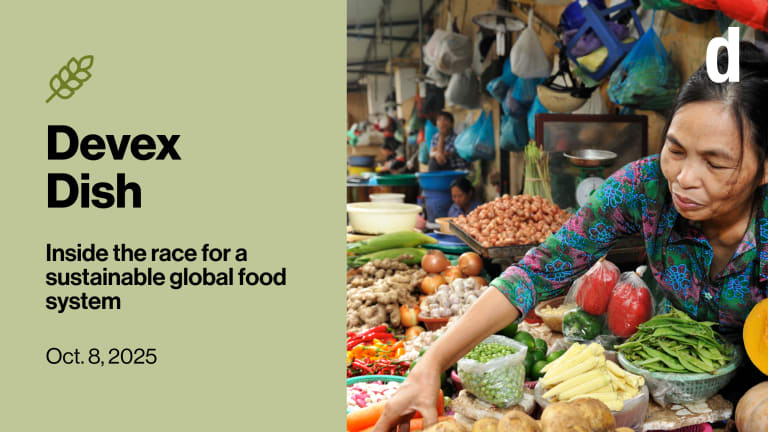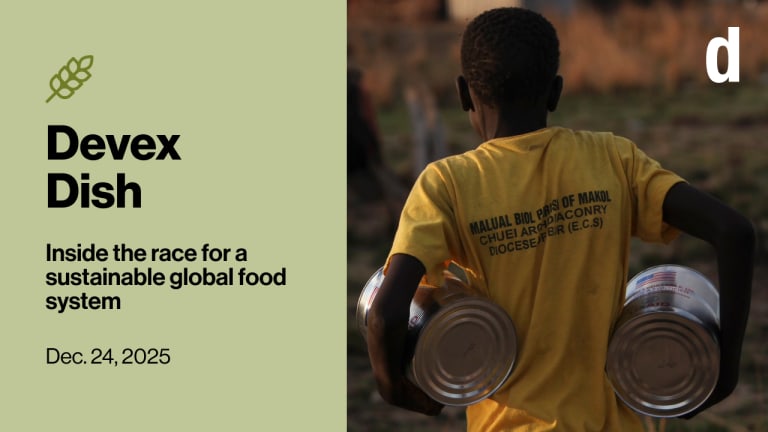
What exactly is a healthy diet and what are the obstacles in ensuring healthy diets for all? What role can the private and public sector play in achieving healthier diets globally, and how can we make healthy diets sustainable? Devex discussed all of this on October 11 in a Twitter chat organized in cooperation with Global Alliance for Improved Nutrition.
These panelists and other organizations took part in the conversation:
Opinion: Fighting hidden hunger with data
What do blindness, stunted growth, and brain damage in children all have in common? They can all be caused by a form of malnutrition. The Food Fortification Initiative, Global Alliance for Improved Nutrition, Iodine Global Network, and Micronutrient Forum explain why fortification is the key to solving this problem and how a new global data tool is changing the landscape on how this work is done.
• Lawrence Haddad, executive director,
GAIN
• Mauricio Adade, chairman of the board,
Africa Improved Foods
• Wolfgang Jamann, secretary general and CEO, Care International
• Beverley Postma, CEO, Harvest Plus
• Gerda Verburg, United Nations assistant secretary general and coordinator of the Scaling Up Nutrition Movement
• Duncan Williamson, food policy manager, WWF UK
Here are some highlights.
• @MauricioAdade1 Globally, an estimated two billion people are affected by deficiencies of essential vitamins and minerals, collectively known as hidden hunger, which
negatively impact health and economic development. It takes a toll on human productivity,
health, and quality of life, it hinders children from reaching their full physical and mental potential, and it impacts the GDP of undernourished nations by 2-10% #NourishingtheWorld
• @l_haddad Scale: 1 in 3 malnourished, heading for 1 in 2 by 2030 unless we do something different. Consequence: 45% mortality from malnutrition. 11% GDP lost in Africa & Asia. 33% more likely in poverty #NourishingtheWorld
• @Fintrac At the start of one of our programs in #Honduras, 18% of children under 5 were underweight, 53% had stunted growth. 55% of children under 2 exhibited low growth patterns, 41% of children 6-23 months received a minimum acceptable diet. Improving nutritional status especially for women and children is a key component of our #Honduras activity #NourishingtheWorld
▶ See all the answers for question one here
• @wjamann Hunger/malnutrition are not accidents but the result of systemic injustices leading to social/economic inequalities #NourishingtheWorld
• @DuncWilliamson Urbanization distances people from their food source, making it harder to source affordable healthy food #NourishingtheWorld
• @BevPostma Zero Hunger is attainable by 2030 but we need stronger food systems. Close the gap between Agriculture - Nutrition #NourishingtheWorld
▶ See all the answers for question two here
• @l_haddad Diets are sustainable if they keep us within health & planetary limits & are accessed by most vulnerable #NourishingtheWorld
• @DuncWilliamson A sustainable/healthy diet is plant based, low meat (not necessarily vegan) and built on a variety of food. It must be tasty and achievable and affordable for all otherwise it isn’t sustainable #NourishingtheWorld
• @GerdaVerburg The first 1000 days are decisive for development of bodies and brains. Stunting creates brain damage that is irreversible. Sustainable diets are also taking care of farmers income, connection to markets and of quality along food value chain #NourishingtheWorld
▶ See all the answers for question three here
• @MauricioAdade1 The first step is to map agricultural,
technical, knowledge, production and human resources available. All sectors of society need to be involved. The exclusion of players yields non-sustainable solutions. The resulting alliances, with clear responsibilities and accountability will provide the balanced, sustainable to convey nutrition in an affordable, aspirational and effective and efficient way #NourishingtheWorld
• @wjamann Advancing gender equality and empowering women must be core principles of approaches like climate-smart agriculture #NourishingtheWorld
• @BevPostma Invest in the agripreneurs in developing countries. 26 million farmers are already growing and eating biofortified crops #NourishingtheWorld
▶ See all the answers for question four here
• @l_haddad Build demand for healthy diets & nutritious food. Do it better (much better!) than now. Support businesses doing good things for nutrition. Call out those that are not. ENGAGE, but do it critically #NourishingtheWorld
• @GerdaVerburg Ending malnutrition is a matter of political will but without strong commitment from politicians #MP’s + investment from domestic budget there is no end to hunger. The #nutrition puzzle can only be solved by collective efforts.
• @BevPostma Invest in what's working and go to scale. @HarvestPlus works with 400 partners to drive impact with #Biofortification
▶ See all the answers for question five here
• @l_haddad Optimism because we have made progress. Ghana's stunting rates are below 20%! More & more people are outraged, determined & able to act -- together. #NourishingtheWorld
• @DuncWilliamson we know the problem and we have many of the solutions and more and more people are making the change #NourishingtheWorld
• @MauricioAdade1 I truly believe forces are learning and aligning. Technology is abundant and affordable, knowledge is #NourishingtheWorld. Sustainability is no longer just an ethical
way of doing business, it is the only way. Industry understands that it must care and nourish society as a whole in order to stay in business in the long run.
▶ See all the answers for question six here
To learn more about GAIN’s work in delivering nutritious food to those most at risk of malnutrition, click here.








